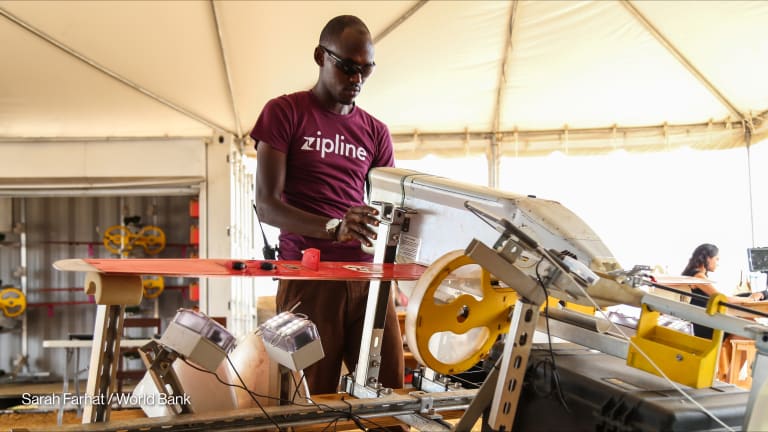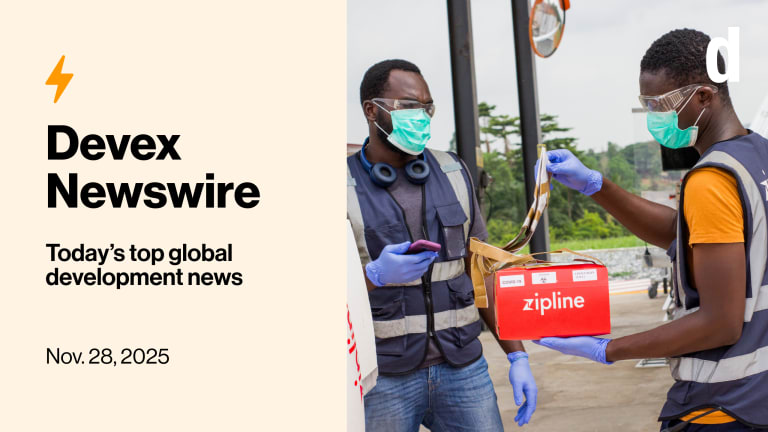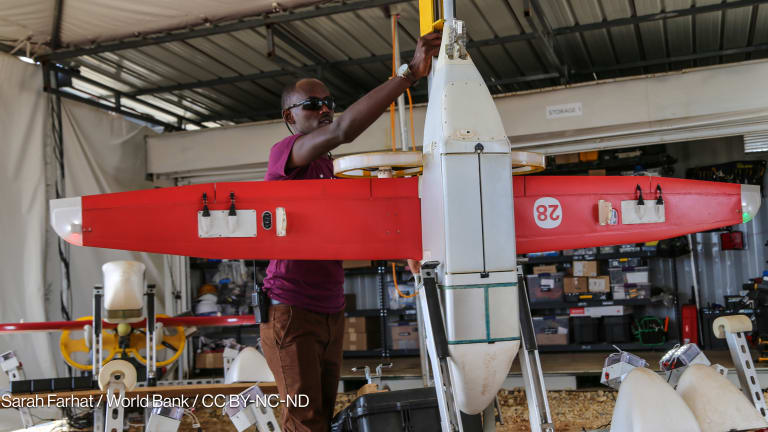5 'drones for good' efforts to watch
A range of drone experts share some of the most exciting projects in the development sector — and their lessons for leaders in global health, international development, and humanitarian response.
SAN FRANCISCO — When people refer to drones, they could mean anything from flying cameras that anyone can use, to unmanned aerial systems that can handle medical delivery at a national scale. Drones have proven their value in areas such as mapping and data collection, but when it comes to delivery, there are few examples of unmanned aerial vehicles, or UAVs, going beyond proof of concept flights. “Instead of saying: ‘We have a drone and we want to bring it to your country,’ it should be: ‘What are your country needs and how can we develop something that works for you?’” --— Uttam Pudasaini, coordinator, Nepal Flying Labs With all the buzz surrounding drones for good, important distinctions — whether drones are remotely piloted or autonomous, what airspeeds and distances they can travel, and whether they can really work at scale — often get lost in the hype. “There is smoke and mirrors, and there is operations,” Andreas Raptopoulos, CEO of Matternet, told Devex. “There is a limited set of operators doing operations.” Many projects end somewhere between starting as a small demo in a backyard and evolving into a pilot for a few weeks. Very few expand to an operation that happens every day, then become an operation that happens every day in all weather conditions, he said. Devex spoke with a range of drone experts about some of the most exciting projects in this space and the lessons they offer for leaders in global health, international development, and humanitarian response. Matternet A technology platform for urban aerial delivery What: Company Established: 2011 Where: United States, Switzerland Strategy: Transporting medical samples via drone, improving the technology and lowering the cost, in order to build a network of unmanned aerial vehicles Based in Silicon Valley, the unmanned aerial vehicle startup Matternet operates in two countries: the U.S. and Switzerland. Recently, the company has been in the headlines because it is — together with the United Parcel Service — behind the first regular commercial drone delivery in the U.S. Matternet got its start in low- and middle-income countries, testing in places including Haiti, Bhutan, and Papua New Guinea; Raptopoulos told Devex the plan is to eventually return to its humanitarian roots. “We are leveraging the commercial markets to get funding into this space so we can develop the reliability and bring down the cost of this technology in order to enable this leapfrog,” he told Devex from the Menlo Park offices of Matternet. Raptopoulos acknowledged that the impact of Matternet is not as direct as Zipline — its rival in Silicon Valley — when it comes to LMICs: “Our model will take more time to reach its destination.” Whereas Matternet tested in LMICs then shifted its focus to Switzerland and the U.S., Zipline’s first customer was the Rwandan government, and the company has since expanded to Ghana. Vaccines in Vanuatu The first time a drone was used to deliver a vaccine to a child What: Demo project When: 2018 Strategy: UNICEF worked with the government of Vanuatu on drone regulations and awarded three commercial contracts to two drone companies: Swoop Aero of Australia and Wingcopter of Germany Drones have distributed swarms of sterile mosquitoes in Brazil, delivered blood in cases of postpartum hemorrhage in Malawi, and provided emergency food supplies in the Dominican Republic. But none of these examples went past proof of concept, according to research commissioned by the Interagency Supply Chain Group. The group commissioned research for a report on use case prioritization for UAVs in global health identified 27 examples, with only four of them going past proof of concept into extended demos. One of those was work by the United Nations Children’s Fund to deliver vaccines by drones in Vanuatu, marking the first time a drone was used to deliver a vaccine to a child. But while this may end up being a short term pilot, its impact could outlast the flights due to the regulations it helped develop. UNICEF brought UAS consultants Katie Gray and Jim Coyne to the islands to work with the Civil Aviation Authority Vanuatu, and the International Civil Aviation Authority is reviewing the recommendations. Leslie Cary, head of the unmanned aircraft program at ICAO, said they may be used as a template for other countries even as international regulations are developed. Flying Labs A global network of local knowledge hubs for robotics What: WeRobotics initiative Established: 2015 Where: Global Strategy: Supporting local capacity for drones for good by identifying local needs, building local skills, increasing local impact, catalyzing local business Use cases: Mapping, monitoring and assessment, cargo, and more WeRobotics, a nonprofit that works with local communities in emerging markets to use robotics for good, is creating a global network of Flying Labs, networks of local drone experts from around the world. “Instead of saying: ‘We have a drone and we want to bring it to your country,’ it should be: ‘What are your country needs and how can we develop something that works for you?’” said Uttam Pudasaini, coordinator of Nepal Flying Labs. She is one of a growing network of drone experts building hyper, local solutions around the world with the support of WeRobotics and its partners. WeRobotics recently released a charter advocating for national aviation authorities and international regulators to take the interest of local drone experts into account. “We kindly request equal access to opportunities including the ability to acquire drone pilot licenses, flight permissions, drone insurance and contracted work,” reads the charter, which is signed by 23 Flying Labs. “We welcome competition from foreign drone experts and companies as long as this competition is based on fair play: a level playing field that grants equal opportunity to local experts.” WeRobotics aims to bring what it calls the “power of local” to unmanned aerial systems. Patrick Meier, co-founder of WeRobotics, said the Flying Labs model is part of an effort to decolonize robotics. His goal is to have more locally owned and managed drone businesses offering drones as a service. “We believe this approach to be more sustainable, more cost-effective, more scalable, and more ethical than top-down approaches,” he said. Sonja Betschart, who co-founded WeRobotics with Meier, was recently in San Francisco for a small gathering on emerging technology hosted by the World Economic Forum’s Centre for the Fourth Industrial Revolution. Her key message on drones was the need to focus not just on the what, but rather the how and the why, and specifically the importance of supporting local drone experts. “What you’re trying to solve with cargo delivery is the inaccessible places,” Betschart told Devex. “If inaccessible places are only places that have a lot of people to solve for it defeats the purpose.” The drones for delivery space is donor-driven versus demand-driven, which makes it more competitive between groups competing for dollars, she said. But her view is that no one company can offer a complete solution, and she is making the case that there is value in supporting solutions of all sizes. Zipline A drone startup focused on medical product delivery What: Company Established: 2011 — as Romotive, which focused on toy robotics, then pivoted to drone delivery in 2014 Where: United States, Rwanda, Ghana Strategy: Partnering with governments to provide reliable delivery drones and autonomous delivery networks for blood and other lifesaving products This is one project the Interagency Supply Chain Group — a group of agencies that coordinate its investment in health supply chains — found in its research on UAVs in global health identified as achieving sustained operations, meaning it went beyond demo flights of cargo drone delivery in LMICs. Zipline, based in Silicon Valley, partnered with Rwanda to establish the first national scale drone delivery network, and recently expanded from Rwanda to Ghana. So far, despite a proliferation of pilots in UAVs for global health delivery, Zipline is the first and only company behind a national scale drone delivery network. The drone is just a delivery vehicle, said Dan Czerwonka, head of global regulatory affairs at Zipline. Other factors, such as medical supply management, which is the more complex part of what the company does, has been the key to the success of the company, he said. The drone technology is only 10% of the complexity, Zipline spokesperson Justin Hamilton said, whereas the other 90% is everything else. In Zipline’s case, building a national scale fulfillment and instant delivery operation integrated with the national health system and airspace. Hamilton said he wants to see more evaluations of drones for cargo delivery, in which companies should answer questions such as these: • How many deliveries can you make per day? • What is the longest delivery flight that you have completed, and where did that flight start, deliver to, and end? • What is the maximum airspeed and cruise airspeed of your drone? • Do you operate beyond visual line of sight (BVLOS)? The Lake Victoria Challenge A platform to connect government and regulators with innovators What: Annual competition When: December 3-5, 2019 Strategy: Convening partners across sectors to ask: “What could happen if Africa can unlock the lower skies as a resource for mobility?” Where: Mwanza City, Tanzania At the Lake Victoria Challenge in Mwanza City, Tanzania this December, individuals will compete for funding to support their work on drones at an event that has with the stated goal of improving the lives of people who live in the world’s most densely populated rural area. “Drones in places like rural Africa can be a frontier market that is pioneering in the same way mobile money was invented in East Africa because of a lack of checkbooks and credit cards,” said Edward Anderson, senior digital development and resilience specialist at the World Bank, who is organizing the event. He talked about frontier use cases that are unique to the African context, such as drone delivery of frozen bull semen for artificial insemination of cows, saying they could be proving grounds for the global drone industry. Anderson said key participants in the Lake Victoria Challenge include civil aviation authorities and other government officials who might “craft a uniquely African perspective on what the lower airspace is for.” He hopes to see African governments, in partnership with donors, NGOs, and others working on drones for good, develop regulations that champion use cases from mapping to mobility while still being responsible about the risks involved. Olivier Defawe, who leads the Drones for Health Program at Village Reach, a nonprofit focused on improving the capacity and reach of health systems, is proposing a track that would focus on practical considerations for integrating drones into existing health supply chain systems. “Before I started investigating the potential of using drones to address last mile health challenges, I was a drone enthusiast,” he wrote in a proposal, which he shared with Devex. “I’ve come full circle to recognize that drones without the supporting ecosystem are just toys.” He wrote in the proposal that he is excited for the opportunity the Lake Victoria Challenge presents “because the last thing we need in public health is an innovation that doesn’t fit into the existing system.”
SAN FRANCISCO — When people refer to drones, they could mean anything from flying cameras that anyone can use, to unmanned aerial systems that can handle medical delivery at a national scale.
Drones have proven their value in areas such as mapping and data collection, but when it comes to delivery, there are few examples of unmanned aerial vehicles, or UAVs, going beyond proof of concept flights.
With all the buzz surrounding drones for good, important distinctions — whether drones are remotely piloted or autonomous, what airspeeds and distances they can travel, and whether they can really work at scale — often get lost in the hype.
This story is forDevex Promembers
Unlock this story now with a 15-day free trial of Devex Pro.
With a Devex Pro subscription you'll get access to deeper analysis and exclusive insights from our reporters and analysts.
Start my free trialRequest a group subscription Printing articles to share with others is a breach of our terms and conditions and copyright policy. Please use the sharing options on the left side of the article. Devex Pro members may share up to 10 articles per month using the Pro share tool ( ).
Catherine Cheney is the Senior Editor for Special Coverage at Devex. She leads the editorial vision of Devex’s news events and editorial coverage of key moments on the global development calendar. Catherine joined Devex as a reporter, focusing on technology and innovation in making progress on the Sustainable Development Goals. Prior to joining Devex, Catherine earned her bachelor’s and master’s degrees from Yale University, and worked as a web producer for POLITICO, a reporter for World Politics Review, and special projects editor at NationSwell. She has reported domestically and internationally for outlets including The Atlantic and the Washington Post. Catherine also works for the Solutions Journalism Network, a non profit organization that supports journalists and news organizations to report on responses to problems.








